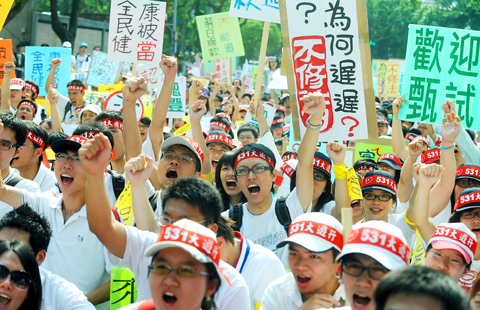About 2,000 medical students took to the streets yesterday, urging the Legislative Yuan to amend the Physician’s Act (醫師法) by the end of the spring legislative session to require medical graduates who obtained their qualifications abroad to take exams in Taiwan.
Protesters gathered at Liberty Square in front of National Taiwan Democracy Memorial Hall, holding up placards that read “Stalling the bill means flunking our health” and “Medical students are not afraid of competition but afraid that tragedies may happen in hospital.”
The protesters from the College of Medicine at Chang Gung University, Taipei Medical University, China Medical University, National Taiwan University and other schools raised their hands, reciting the doctor’s oath as they urged lawmakers to push through the proposed amendment.

PHOTO: WANG YI-SUNG, TAIPEI TIMES
“I shall practice medicine with my conscience and dignity. Patients’ health should be my first priority,” they chanted.
The chairman of the Federation of Medical Students in Taiwan Chien Yu-chuan (簡佑全) urged the government to take the proposed amendment seriously and require all medical students graduating from schools overseas to pass qualification examinations in Taiwan.
“The government should also require that all overseas graduates complete an internship at hospitals in Taiwan in a bid to safeguard the health of our people,” Chien said.
The demonstration came in the wake of a recent controversy involving Taiwanese students attending medical schools in Poland when medical students launched an online campaign questioning the quality of medical education there.
In response, Minister of Health Yeh Chin-chuan (葉金川) expressed his support for the introduction of qualification examinations and internships in Taiwan for graduates who attend medical school abroad.
However, the move drew criticism from Taiwanese medical students in Poland and their parents, who feared the impact of such a proposed amendment on their careers in Taiwan, while authorities of the Poznan University of Medical Sciences in Poland traveled to Taiwan to defend the school’s curriculum and the competence of its graduates.
Yeh, along with officials from the Ministry of Education, stood by their proposed amendment during a public hearing on May 6.
“As Taiwanese medical students, we are afraid that the health of the public will be compromised as a result of the poor quality of medical education [in Eastern Europe],” Chien told reporters yesterday.
“We all know that the quality of medical education abroad is uneven and there is also a language barrier. It is impossible for us to have confidence in the quality of medical training and education in every country,” Chien said.
Lin Chin-yi (林親怡), a representative from the School of Traditional Chinese Medicine at Chang Gung University, stressed the importance for overseas medical graduates to completing internships in Taiwan, even though some might have already completed an internship abroad.
She said the graduates would learn from Taiwanese patients during their internship at hospitals, which would help them understand and treat illnesses that were more prominent among people in Taiwan.
A press release by the Taiwan Medical Association said the organization had resolved to support the proposed qualification examinations and internship.

Chinese Nationalist Party (KMT) Chairman Eric Chu (朱立倫), spokeswoman Yang Chih-yu (楊智伃) and Legislator Hsieh Lung-chieh (謝龍介) would be summoned by police for questioning for leading an illegal assembly on Thursday evening last week, Minister of the Interior Liu Shyh-fang (劉世芳) said today. The three KMT officials led an assembly outside the Taipei City Prosecutors’ Office, a restricted area where public assembly is not allowed, protesting the questioning of several KMT staff and searches of KMT headquarters and offices in a recall petition forgery case. Chu, Yang and Hsieh are all suspected of contravening the Assembly and Parade Act (集會遊行法) by holding

PRAISE: Japanese visitor Takashi Kubota said the Taiwanese temple architecture images showcased in the AI Art Gallery were the most impressive displays he saw Taiwan does not have an official pavilion at the World Expo in Osaka, Japan, because of its diplomatic predicament, but the government-backed Tech World pavilion is drawing interest with its unique recreations of works by Taiwanese artists. The pavilion features an artificial intelligence (AI)-based art gallery showcasing works of famous Taiwanese artists from the Japanese colonial period using innovative technologies. Among its main simulated displays are Eastern gouache paintings by Chen Chin (陳進), Lin Yu-shan (林玉山) and Kuo Hsueh-hu (郭雪湖), who were the three young Taiwanese painters selected for the East Asian Painting exhibition in 1927. Gouache is a water-based

Taiwan would welcome the return of Honduras as a diplomatic ally if its next president decides to make such a move, Minister of Foreign Affairs Lin Chia-lung (林佳龍) said yesterday. “Of course, we would welcome Honduras if they want to restore diplomatic ties with Taiwan after their elections,” Lin said at a meeting of the legislature’s Foreign Affairs and National Defense Committee, when asked to comment on statements made by two of the three Honduran presidential candidates during the presidential campaign in the Central American country. Taiwan is paying close attention to the region as a whole in the wake of a

OFF-TARGET: More than 30,000 participants were expected to take part in the Games next month, but only 6,550 foreign and 19,400 Taiwanese athletes have registered Taipei city councilors yesterday blasted the organizers of next month’s World Masters Games over sudden timetable and venue changes, which they said have caused thousands of participants to back out of the international sporting event, among other organizational issues. They also cited visa delays and political interference by China as reasons many foreign athletes are requesting refunds for the event, to be held from May 17 to 30. Jointly organized by the Taipei and New Taipei City governments, the games have been rocked by numerous controversies since preparations began in 2020. Taipei City Councilor Lin Yen-feng (林延鳳) said yesterday that new measures by